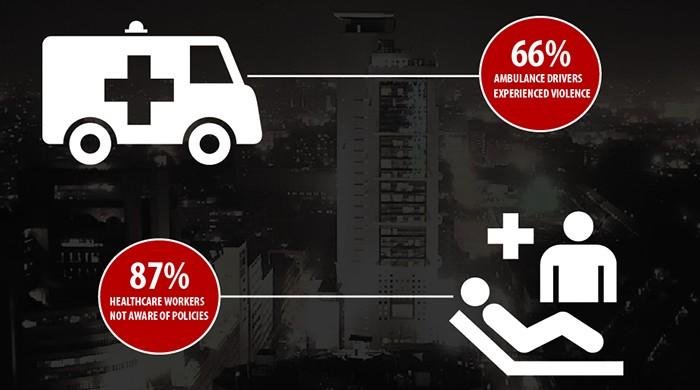Karachi global leader in research on violence targeting healthcare, ambulance staff
December 10, 2016

KARACHI: Sindh’s provincial capital and the financial hub of Pakistan, Karachi is the global leader when it comes to research on violence targeted towards health workers and ambulance staff while performing their duties. This remarkable achievement was shared by Giovani Trambiolo, Operational Advisor of International Committee of Red Crescent Pakistan at a local hotel here.
Mr. Trambiolo said the study on violence against all health care professionals and ambulance staff showed these people are the most vulnerable to violence. Result showed that 66% of ambulance drivers had experienced verbal or physical violence while 87 % of health care workers were not aware of any institutional policies to tackle violence at their work place.
Giovani Trambiolo further said that in 2016 the “Health Care in Danger Project” survey was started and after one year there has been a 17 % increase in public awareness campaigns on respecting ambulances’ right of way, entitled RastaDein.
Healthcare in Danger Project Advisor of the International Committee of the Red Cross (ICRC) Giovani Trambiolo, praised the initiative: “What distinguishes the Karachi project is the home-grown nature of the solutions developed, based on credible research. These solutions are also inspiring initiatives in other countries.” He stressed ICRC’s ongoing commitment of making Karachi safe for health-care staff and patients
Executive Director JPMC, Dr Seemin Jamali said that in the survey six areas of Karachi had been chosen. A traffic analysis was conducted in which routes of ambulances where observed by volunteers. This analysis was conducted over different time periods throughout the day and dealt with high and low traffic durations. It was observed that vehicles were not moving aside for ambulances and this was specially the case for mini buses.
The research head of this survey, Dr Lubna Baig said the study focused on patterns of violence against health-care staff and facilities in Karachi along with an analysis of the legal framework safeguarding health care, with a view to developing a state-wide strategy. Manuals on de-escalating violence in health-care facilities and caring for victims were tested in training sessions attended by more than 450 healthcare professionals in Karachi. Course materials were developed for medical students and a preparedness study to identify safety recommendations was conducted in five hospitals.











